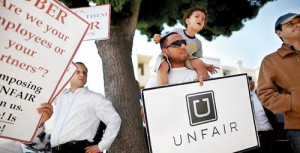Former tech darling Uber comes under fire, literally
It was not long ago that Uber, a ridesharing app aimed at revolutionising taxi services, was a rising star with unparalleled future prospects. So much so that the company was touted, and maybe still is today, as the world’s most highly capitalised start-up with a valuation of approximately US$ 41 billion, including media reports of a “jump” in valuation by as much US$ 15 billion in just one week.
In fact, Uber and similar apps, such as Ola in India and Didi Kuaidi in China, have profited greatly, and continue to do so, from this novel business model, as witnessed by it just this month closing a US$ 2 billion funding round that likely puts it on par with Uber’s valuation.
These big numbers have captured the imagination of the tech industry to such an extent that the apps associated with this fledgling taxi and delivery sharing economy have become highly sought after, and most importantly in terms of attracting much-needed investor funding. And this is not only an international phenomenon. Companies in Sri Lanka including a big telecom firm, have been planning to experiment with Uber-type service offerings, while a recent rash of Uber-type apps at hackathons such as the recently concluded local TADhack have promoted this concept even more, capturing local attention to a previously unheard of degree.

Uber drivers protested working conditions in Santa Monica, Calif., last year. REUTERS
However, this Uber-spurred large-scale, global taxi and delivery sharing economy (Uber alone is forecasting US$ 10 billion in revenue for 2015) has increasingly come under attack. Or, in a more literal sense, under fire; as was strangely mimicked by the most recent crisis to befall Uber, this time in South Africa, where Uber drivers were threatened at gunpoint by local taxi drivers fearing for their livelihood.
First of all, let’s put things into perspective, Uber and its ilk are not only creating new opportunities, they are also killing well-established and long-standing careers. Take for example the cost for a taxicab medallion in the higher-end New York City market, estimated at US$ 950,000 in 2014, which has dropped significantly since services like Uber came online. Consider the high level of resentment resulting from a loss of an investment of this magnitude. As such, there is quite a significant backlash from existing vendors, and even the lawmakers they support, with many already having taken steps to tie Uber up into regulatory knots in countries like France, Germany, Spain and Hungary.
In addition, Uber has also suffered from a number of highly publicised snafus, the most significant of which were due to a lack of steps taken in screening drivers for its taxi services. Overall, to date, the company has been cited in media reports for allegedly threatening journalists, mistreating disabled passengers, sabotaging competitors, mishandling safety issues and, to top it all off, being blamed for sexual abuse in India. In fact, a new crisis brewing this month again continues to batter ridesharing’s reputation in that country, a result of the BBC reporting a driver attached to Indian Uber-clone Ola having been witnessed to masturbating by a passenger.
Added to this are the protests and class action lawsuits, and even a data breach of approximately 50,000 driver names and vehicle numbers, which Uber only reported five months after the fact.
All in all, the journey ahead continues to be a turbulent one for former tech darling Uber, and its second–mover regional clones, which may have lost some of its lustre in recent days. But, considering the quantum of investments sunk into them so far, it has no choice but to continue their mission of “disruption”, bringing down long-existing taxicab fraternities and networks, across the world, in its wake.


